
Julia Agrippina, also referred to as Agrippina the Younger, was Roman empress from AD 49 to 54, the fourth wife and niece of emperor Claudius, and the mother of Nero.

Gaius Caesar Augustus Germanicus, better known by his nickname Caligula, was Roman emperor from AD 37 until his assassination in AD 41. He was the son of the Roman general Germanicus and Augustus' granddaughter Agrippina the Elder, members of the first ruling family of the Roman Empire. He was born two years before Tiberius was made emperor. Gaius accompanied his father, mother and siblings on campaign in Germania, at little more than four or five years old. He had been named after Gaius Julius Caesar, but his father's soldiers affectionately nicknamed him "Caligula".
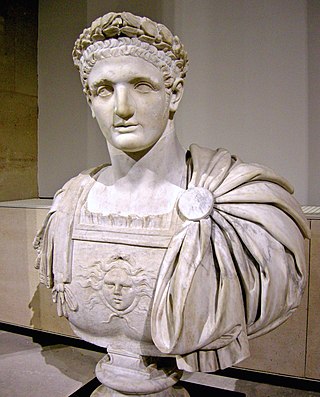
Domitian was Roman emperor from 81 to 96. The son of Vespasian and the younger brother of Titus, his two predecessors on the throne, he was the last member of the Flavian dynasty. Described as "a ruthless but efficient autocrat", his authoritarian style of ruling put him at sharp odds with the Senate, whose powers he drastically curtailed.
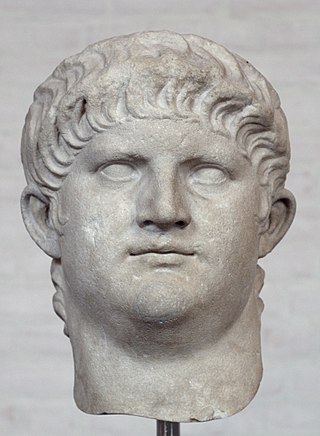
Nero Claudius Caesar Augustus Germanicus was a Roman emperor and the final emperor of the Julio-Claudian dynasty, reigning from AD 54 until his death in AD 68.
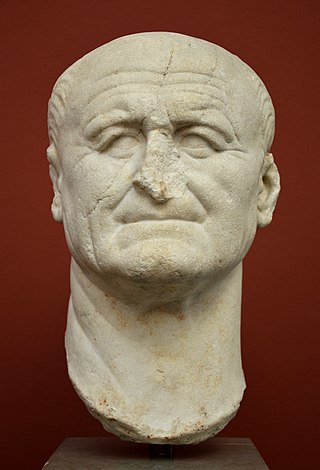
Vespasian was Roman emperor from 69 to 79. The last emperor to reign in the Year of the Four Emperors, he founded the Flavian dynasty, which ruled the Empire for 27 years. His fiscal reforms and consolidation of the empire brought political stability and a vast building program.

Titus Caesar Vespasianus was Roman emperor from 79 to 81. A member of the Flavian dynasty, Titus succeeded his father Vespasian upon his death, becoming the first Roman emperor to succeed his biological father.
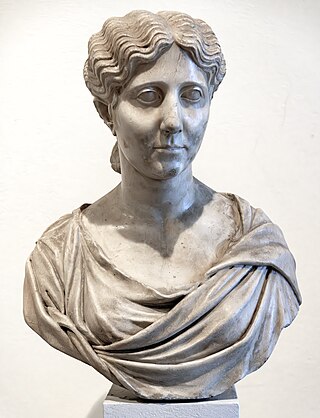
Antonia Minor was the younger of two surviving daughters of Mark Antony and Octavia Minor. She was a niece of the Emperor Augustus, sister-in-law of the Emperor Tiberius, paternal grandmother of the Emperor Caligula and Empress Agrippina the Younger, mother of the Emperor Claudius, and maternal great-grandmother of the Emperor Nero. She outlived her husband Drusus, her oldest son, her daughter, and several of her grandchildren.
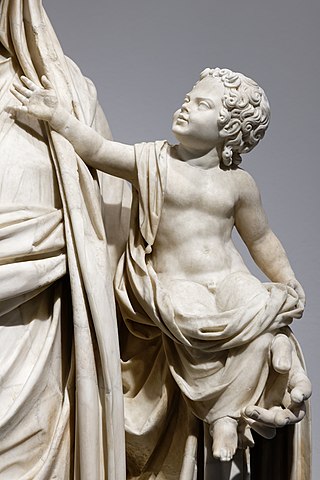
Tiberius Claudius Caesar Britannicus, usually called Britannicus, was the son of Roman Emperor Claudius and his third wife, Valeria Messalina. For a time, he was considered his father's heir, but that changed after his mother's downfall in 48, when it was revealed she had engaged in a bigamous marriage without Claudius' knowledge. The next year, his father married Agrippina the Younger, Claudius' fourth and final marriage. Their marriage was followed by the adoption of Agrippina's son, Lucius Domitius, whose name became Nero as a result. His stepbrother would later be married to Britannicus' sister Octavia and soon eclipsed him as Claudius' heir. After his father's death in October 54, Nero became emperor. The sudden death of Britannicus shortly before his fourteenth birthday is reported by all extant sources as being the result of poisoning on Nero's orders; as Claudius' biological son, he represented a threat to Nero's claim to the throne.
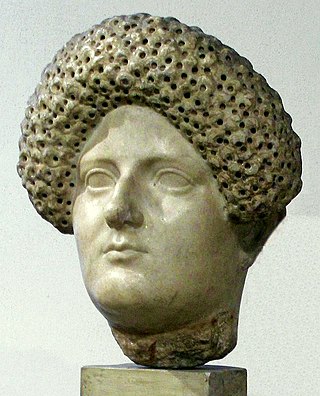
Domitia Longina was a Roman empress and wife to the Roman emperor Domitian. She was the youngest daughter of the general and consul Gnaeus Domitius Corbulo. Domitia divorced her first husband, Lucius Aelius Lamia Plautius Aelianus in order to marry Domitian in AD 71. The marriage produced only one son, whose early death is believed to have been the cause of a temporary rift between Domitia and her husband in 83. She became the empress upon Domitian's accession in 81, and remained so until his assassination in 96. She is believed to have died sometime between AD 126 and 130.
Claudia Acte was a freedwoman of ancient Rome who became a mistress of the emperor Nero. She came from Asia Minor and might have become a slave of the Emperor Claudius, following his expansion of the Roman Empire into Lycia and Pamphylia; or she might have been purchased later, by Octavia, Claudius' daughter.

Claudia Livia was the only daughter of Nero Claudius Drusus and Antonia Minor and sister to Roman Emperor Claudius and general Germanicus, and thus paternal aunt of emperor Caligula and maternal great-aunt of emperor Nero, as well as the niece and daughter-in-law of Tiberius. She was named after her grandmother, Augustus' wife Livia Drusilla, and commonly known by her family nickname Livilla. She was born after Germanicus and before Claudius.
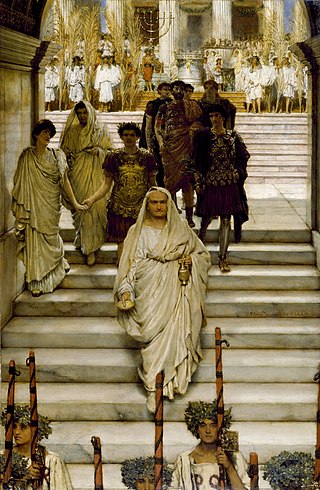
The Flavian dynasty, lasting from AD 69 to 96, was the second dynastic line of emperors to rule the Roman Empire following the Julio-Claudians, encompassing the reigns of Vespasian and his two sons, Titus and Domitian. The Flavians rose to power during the civil war of AD 69, known as the Year of the Four Emperors; after Galba and Otho died in quick succession, Vitellius became emperor in mid 69. His claim to the throne was quickly challenged by legions stationed in the eastern provinces, who declared their commander Vespasian emperor in his place. The Second Battle of Bedriacum tilted the balance decisively in favor of the Flavian forces, who entered Rome on 20 December, and the following day, the Roman Senate officially declared Vespasian emperor, thus commencing the Flavian dynasty. Although the dynasty proved to be short-lived, several significant historic, economic and military events took place during their reign.

Gnaeus Domitius Ahenobarbus was a member of the imperial Julio-Claudian dynasty of Ancient Rome. Domitius was the son of Antonia Major. He married Agrippina the Younger and became the father of the emperor Nero.

Claudia Antonia was the daughter and oldest surviving child of the Roman Emperor Claudius and the only child of his second wife Aelia Paetina. Antonia was a great great-niece of the Emperor Augustus, great-niece of the Emperor Tiberius, first cousin of the Emperor Caligula, half-sister to Claudia Octavia and Britannicus, and cousin, stepsister and sister-in-law of the Emperor Nero.

Milonia Caesonia was Roman empress as the fourth and last wife of the Roman emperor Caligula from their marriage in AD 39 until they were both assassinated in 41.
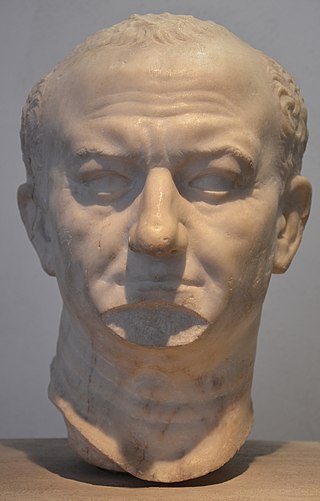
The gens Flavia was a plebeian family at ancient Rome. Its members are first mentioned during the last three centuries of the Republic. The first of the Flavii to achieve prominence was Marcus Flavius, tribune of the plebs in 327 and 323 BC; however, no Flavius attained the consulship until Gaius Flavius Fimbria in 104 BC. The gens became illustrious during the first century AD, when the family of the Flavii Sabini claimed the imperial dignity.

Octavia the Younger was the elder sister of the first Roman emperor, Augustus, the half-sister of Octavia the Elder, and the fourth wife of Mark Antony. She was also the great-grandmother of the Emperor Caligula and Empress Agrippina the Younger, maternal grandmother of the Emperor Claudius, and paternal great-grandmother and maternal great-great-grandmother of the Emperor Nero.
Titus Flavius T. f. T. n. Sabinus was a Roman politician and soldier. A native of Reate, he was the elder son of Titus Flavius Sabinus and Vespasia Polla, and brother of the Emperor Vespasian.
Paris was an actor in Rome in the 1st century AD.
Halotus was a eunuch servant to the Roman Emperor Claudius, the fourth member of the Julio-Claudian dynasty. He served Claudius as a taster and as a chief steward; it was because of his occupation, which entailed close contact with Claudius, that he is and was a suspect in the murder of the latter by poison. Along with Agrippina the Younger, the wife of Claudius, Halotus was considered one of the most likely to have committed the murder, although speculation by ancient historians suggest that he may have been working under orders of Agrippina.
















